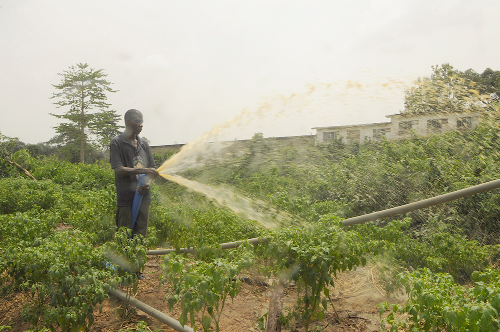Meet University Chancellor whose garden is full of used tyres
Inside a whitewashed house in Accra, rows of swinging green vines sit on used car tyres. To the ordinary eye, these are climbing ornamental plants.
But in reality, they are yams.
Just beside them are garden eggs, taros plants and herbs all beautifully lined up in either car tyres or flower pots.

This is the backyard garden of Dr Paul Kofi Fynn, the Chancellor of the Wisconsin International University College.
Dr Fynn’s had been wondering how he could turn his highly concretized family house into a garden of vegetables and blazing colours of his favourite flowers he had been yearning for.
His eureka moment came while taking a stroll.
“I saw a number of tyres lying around in my neighbourhood and it hit me that I could easily put black soil in them and grow something,” he said.
The idea became an obsession and in no time, a truck delivered the soil which he loaded into packs of tyres numbering more than 100.
In a household in which yam is a delicacy, many yam heads were planted. Taros (cocoyam) were added then vegetables including tomatoes, garden eggs, pepper and herbs.
On December 7, 2019, Dr Fynn joined the rest of the country in celebrating Farmers’ Day by harvesting his first yam.
“I feel really excited. This space would have been wasted but as you can see, These is food that can help the household,” the Octogenarian said.
With permission from Dr. Fynn, who is also the President-General of the West Africa Nobles Forum, a young man lifts up one of the tyres.
He digs up the earth, delicately removing a thick yam from the soil. He does same for three other set of lorry tyres removing varying shapes and sizes of yams from them.
“Wooow! Grandpa, the yams are big,” Dr Fynn’s granddaughter, exclaimed as she watches in awe, while the young man dug into the dirt to remove each yam.
Beaming with smile, he remarks that the Ghanaian youth had no business saying there were no jobs.
“People value fresh food.These unemployed young people could easily grow vegetables at homes and sell to their neighbours,” he said, brushing off dirt from one of the yams.
Although Rev. Dr Fynn’s house could best be described as concrete jungle, because it is heavily built up, it also has patches of green space with a blaze of colours that brings the house to life.
Apart from the ornamental plants, beneath a carpet grass sits giant pots that house ornamental plants, as well as cocoyams that produce the household’s kontomire (taro leaves), pepper and some herbs.
Home gardening
Generally, home gardening refers to the cultivation of a small portion of land which may be around the household or within walking distance from the family home.

Home gardens can be described as a mixed cropping system that encompasses vegetables, fruits, plantation crops, spices, herbs, ornamental and medicinal plants, as well as livestock that can serve as a supplementary source of food and income.
“The food you grow yourself is the freshest food you can eat.And because home gardens are filled with fruits and vegetables, it’s also among the healthiest food you can eat,” Dr Fynn said.
Not surprisingly, several studies have shown that gardeners eat more fruits and vegetables than their peers.
Gardens, in addition to being a source of fresh, healthy produce, ease stress and even improves the mood.
Backyard gardens
While food prices continue to rise and fall, the fact remains that most people have shied away from backyard gardens.
One would have wished that the planting for food and jobs policy, modelled on the highly successful “Operation Feed Yourself (OFY)” programme of the 1970s, would drive urban and backyard gardening, but that has not been the case.
The policy has been biased towards farmers in rural communities, who could have been encouraged to focus more on producing enough for the export market.
Households don’t need much land to start a backyard garden.

With lorry tyres and abandoned plastic bowls, fresh vegetables could bloom in homes across the country.
Give it a thought, particularly when research after research points to the fact that farmers in our cities are using contaminated water to irrigate the produce.
A survey carried out between 2007 and 2008 by the Small Grants Programme of the UNDP/Global Environment Facility (GEF) revealed that vegetables consumed in Accra had more than a dozen chemicals above tolerable percentages and these have serious health consequences for consumers.

With the Sustainable Development Goal (SDGs) one and two targeting the eradication of poverty and hunger, there can be no better way to achieve that than to incentivise the urban poor not just to grow their own food, but also sell as well.
The next time you see a vehicle tyre or throwing one away, just think of the potential garden you are dumping



